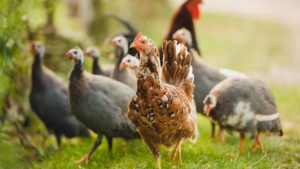




As much as we love guinea fowl, and as much help as they can be to the farm or homestead trying to find a natural control for many of the pests that we’d like to be rid of, guinea fowl are not for everybody.
These days, most people get guineas for bug control or (in some cases) snake control. And a few people get them for nostalgic reasons, because their parents or grandparents had them.
Because they are a somewhat wild breed, people are tempted to think that they can fend for themselves. And in their native environment, that may be true. For the various environments we have imported them into, however, they need all the same kinds of care that we would give to any other poultry.
They need shelter for the night. And their coop requirements are different from that of chickens. Coops for guinea fowl should be larger, taller, lighter, with a bigger door, and with the capacity for a light on inside the coop at night. Unlike chickens, guineas don’t instinctively go into a building to roost at night, but they can easily be trained. You will have to be available for a period of time to get them in the habit of returning to their coop to roost.
During the warm months, guineas will get most of their nutritional needs from foraging. During the off-season, they’ll be dependent on you for their full nutrition. There likely won’t be enough bugs or greens for them, so they’ll need a complete feed of some type: flock grower, for example. They’ll appreciate treats of dried mealworms or chopped up hardboiled egg. Greens, alfalfa hay, hanging cabbages or cucumbers will help provide them minerals they’ll be craving and will also stimulate their foraging instincts and keep them active.
Fresh water should be available during the day. They do not need a waterer in their coop, and having one will encourage rodents and insects.
Like all poultry, guinea fowl may occasionally need medical care. Although guinea fowl are generally more resistant to most poultry parasites and diseases, you can still expect that, at some point, you may need to treat for worms, scaly leg mites, coccidiosis, prolapsed vent, or injuries. You’ll need to be prepared to round up and safely house an unexpected hatch of guinea keets, as guinea moms are adept at hiding their nests. Nearly every guinea-keeper has been surprised by a missing female coming home with a string of babies in tow. Because most of our climate, terrain, and predator conditions are so different from those that these birds evolved in, they have gained a reputation as “bad moms,” but in reality, they are faced with obstacles they are not equipped for. They need our help to successfully rear their keets, so you’ll need to be prepared for that.
Guineas are very active birds, and your own health and level of physical activity need to be up to the task. They are ranging birds, and they are very fast. Even day-old keets are fast on their feet. Another revelation for some people is that guineas become very disoriented by snow. They take to the trees or rooftops when there’s snow on the ground. Unless you plan to keep them confined to their coop, you’ll need to shovel a very large path and landing area, or spread hay or mulch, so that they feel safe when it snows. And don’t forget that the feeders and waterers and coops all need regular cleaning.
As with all animals, guineas will impact your ability to go on vacation. It’s best to have a plan for a reliable poultry-sitter before you start with guineas.
Guinea fowl tend to be skittish, flighty birds. People who are themselves somewhat high-strung or easily stressed out may find guinea-keeping overwhelming.
Guineas can be noisy. They alarm at anything unusual, which is one of the reasons why people add them to their farms. They are valuable alert systems for your other poultry. But they also alert at things they consider threatening, but we don’t – such as a garden hose left stretched out in the lawn, or autumn leaves falling from the tree. Like humans, guineas are noisiest when they’re young. Once they get past their teenage phase (at about one year), they tend to settle down and become quieter. At that point, when they sound the alarm, it’s worth going outside to check on things yourself. People who are very sensitive to loud noises, or people working from home and needing peace and quiet for conference calls may not appreciate having guineas.
Finally, consider the other members of your household, particularly the furry ones. Cats are usually not a threat to grown guineas, but they can and probably will try to chase and kill them when they’re still in the keet stage.
Dogs can be more problematic. Do your dogs show an interest in birds, or in chasing things? If so, they probably will not mix well with guineas. In that case, you’ll have to make a choice either to not have guineas, or to keep them separate. Guineas and dogs can be kept separate by keeping either penned, or by alternating the pen-time. In my case, the dogs get some free time in the morning before I let the guineas out, then the dogs stay inside during the day while the guineas free-range, then the dogs get to be outside after the guineas are in their coop for the night. A guinea’s first instinct is to run, rather than fly, to escape predators, and guinea fowl cannot outrun dogs. If you or your neighbors have free-roaming dogs, you may not be able to add guineas to your homestead.
Consider what your likely predator problems are and how to minimize them. Motion-sensitive lights, livestock guardian dogs on patrol, a low electric line around the base of your poultry yard are ways to discourage nighttime predators. The wire on your coop should be galvanized rather than chicken wire (too many predators can tear through chicken wire). To help with daytime predators, a little landscaping should provide enough ground cover for the guineas to get under in case of hawks. Guineas should not be let out of their coops at sunrise, and especially not on foggy/rainy days, as coyotes and other nighttime predators tend to hunt during those transitional hours, especially during times when their food is scarce or when they have babies to feed.
As with anything else you do in life, you should figure out what are your goals (why do you want guineas) and then what do you need to be a successful guinea-keeper.






